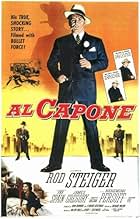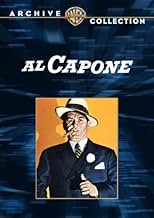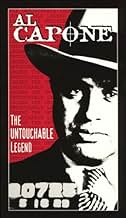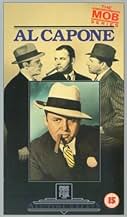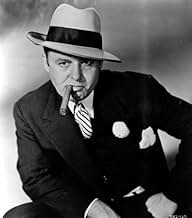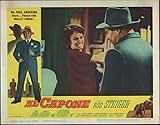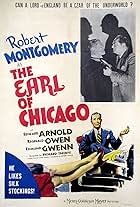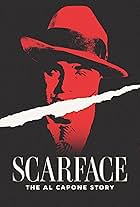IMDb RATING
6.7/10
2.1K
YOUR RATING
A chronicle of the rise and fall of Chicago crime boss Al Capone during the Prohibition era.A chronicle of the rise and fall of Chicago crime boss Al Capone during the Prohibition era.A chronicle of the rise and fall of Chicago crime boss Al Capone during the Prohibition era.
- Awards
- 1 win & 1 nomination total
Raikin Ben-Ari
- Ben Hoffman
- (as Ben Ari)
Fred Aldrich
- Funeral Spectator
- (uncredited)
Cindy Ames
- Nurse
- (uncredited)
- Director
- Writers
- All cast & crew
- Production, box office & more at IMDbPro
Storyline
Did you know
- TriviaMartin Balsam's character, Mac Keeley, was based on a real-life Chicago Tribune reporter named Jake Lingle. Lingle, a "legman" who ran down gang-related stories for the paper, had close ties to Al Capone and other gangsters as well as the notoriously corrupt Chicago Police Department, and he was well-paid by both mobsters and a police commissioner as a "go-between." Lingle was gunned down on June 9, 1930, much as depicted in the movie, after "getting too big for his hat", as Capone put it, and demanding too much for his services (though a Capone rival likely paid for the hit). Apparently legal concerns prevented the producers of this film from using Lingle's name. However, just a few months after this film was released, the TV series The Untouchables (1959) told Lingle's story in its third episode and used his actual name.
- GoofsAl Capones had two scars on his left cheek according to actual (if rare - Capone disliked being photographed to show them as is correctly pointed out in the film) photos. The depiction in films like The St. Valentine's Day Massacre (1967) and Capone (1975) is closer to the truth.
- Quotes
Al Capone: Nobody leaves Al Capone, you understand that?
Maureen Flannery: Well I do!
Al Capone: Oh no, you don't!
Maureen Flannery: Would you do me a favor please? Would you kill me?
- ConnectionsEdited into The Mystery of Al Capone's Vaults (1986)
Featured review
This 1959 picture is yet another cinematic retelling of the life of mobster Al Capone, and is better than most I've seen. Rod Steiger as Big Al seems miscast at first but wins me over in the end. Steiger was a born ham, but a fine actor for all his Methodish mannerisms, and has moments in the movie in which he's almost hypnotically effective. Yes, it's a performance, I kept on telling myself, but so was Capone himself. Over the top, perhaps, but Capone was himself more than a little touched, and Steiger nails this aspect of Capone to perfection, and is more effective in capturing the big guy's capriciousness than Robinson or Muni before him. Steiger's Capone isn't merely a gangster, he's a man possessed.
Director Richard Wilson's keeps this fairly modestly budgeted film moving at a fast pace, and it's never boring. In supporting roles, Fay Spain, Martin Balasm, James Gregory and Nehemiah Persoff are all effective. The black and white of this film evokes the late fifties more than the roaring twenties, and the movie at times feels a little like an episode of The Untouchables, at other times like Some Like It Hot. The Jazz Age was itself hot as the Eisenhower era was drawing to a close. F. Scott Fitzgerald's novels were coming back into vogue. O'Neill revivals on and off-Broadway were becoming commonplace. Al Capone captures this nostalgic mood, but really makes me nostalgic for the fifties more than for the twenties, for a time when fairly recent history could still be viewed as larger than life, the stuff of serious art and contemplation, not just fashionable nostalgia. Al Capone the movie is more nostalgia than serious art, but it touches on important issues, concerning violence, friendship, the role of government and the press as they pertain to and often collude with the criminal element, that still resonate today.
Director Richard Wilson's keeps this fairly modestly budgeted film moving at a fast pace, and it's never boring. In supporting roles, Fay Spain, Martin Balasm, James Gregory and Nehemiah Persoff are all effective. The black and white of this film evokes the late fifties more than the roaring twenties, and the movie at times feels a little like an episode of The Untouchables, at other times like Some Like It Hot. The Jazz Age was itself hot as the Eisenhower era was drawing to a close. F. Scott Fitzgerald's novels were coming back into vogue. O'Neill revivals on and off-Broadway were becoming commonplace. Al Capone captures this nostalgic mood, but really makes me nostalgic for the fifties more than for the twenties, for a time when fairly recent history could still be viewed as larger than life, the stuff of serious art and contemplation, not just fashionable nostalgia. Al Capone the movie is more nostalgia than serious art, but it touches on important issues, concerning violence, friendship, the role of government and the press as they pertain to and often collude with the criminal element, that still resonate today.
- How long is Al Capone?Powered by Alexa
Details
- Release date
- Country of origin
- Language
- Also known as
- The Al Capone Story
- Filming locations
- Production company
- See more company credits at IMDbPro
Box office
- Budget
- $550,000 (estimated)
- Runtime1 hour 44 minutes
- Color
- Aspect ratio
- 1.85 : 1
Contribute to this page
Suggest an edit or add missing content



